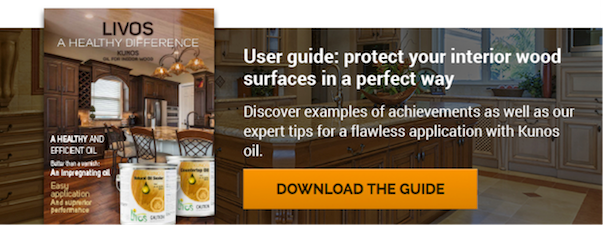If you have a bamboo kitchen counter, you may wonder about its protection. Bamboo is no ordinary wood! Bamboo shoots are an exotic species well-known for its unfailing resistance. If you want your kitchen counter to stay intact for years, follow our tips on the protection and maintenance of bamboo surfaces.
IS A BAMBOO COUNTER AN ECOLOGICAL CHOICE?
Bamboo is a renewable source. Of all raw materials, bamboo has the fastest growth. Felling bamboo does not require reafforestation since it reproduces rapidly. Its only shortcoming is that it comes from far away. Transportation is a downside of its environmental file. Another snag: in some areas, the popularity of bamboo has caused deforestation problems. Make sure your bamboo counter has the FSC certification to insure sustainable forest management.
WHAT PRODUCT SHOULD BE USED TO PROTECT BAMBOO?
In the case of a kitchen surface, oil is the best option. This product reacts best when in contact with food and is also water resistant. Using oil will give mat finish and make your counter look natural. Varnish is not recommended since it does not resist kitchen related activities, such as using knives. Since counters are frequently used, an oil-based product is your best ally.
DO I HAVE TO SAND MY BAMBOO COUNTER?
If the counter has already been sanded, you do not need to do it a second time. However you should check if the surface has been sealed with a colourless product or if the bamboo is dry. This sealer or resin naturally present in the bamboo wood still green would prevent the oil from penetrating. If your counter has not yet been sanded, gradual sanding is recommended. Your surface is then ready for oiling.
HOW TO APPLY OIL ON A BAMBOO SURFACE?
To optimize the oiling, use a cotton wick instead of a brush. A cotton wick provides a nicer finish while reducing product loss. To oil bamboo, rub in the oil instead of just laying it on the wood.
HOW MANY COATS SHOULD BE APPLIED?
For a tight protection, 3 is the best number of coats. However solvent-free pure oils require even more coats (5 to 7) and longer drying time. You must wait at least 12 hours.
If the number of coats is not sufficient, even a wet cloth will make the wood rough.
SHOULD I WIPE OFF THE EXCEEDING OIL?
You must wipe the exceeding oil off your bamboo surface. 10 to 15 minutes after the application, you will notice that the surface seems to be sweating. This is the exceeding oil that comes up to the surface.
WHY IS THE BAMBOO SURFACE STICKY?
The answer is easy: it is because you allowed the exceeding oil to dry. In this case, sand the surface in order to remove a thin layer of the product, and then apply a new coat of oil. Carefully wipe off the excess.
CAN A BAMBOO SURFACE BE STAINED?
It is very easy to change the colour of your bamboo counter. Oils for interior surfaces come in various colours ranging from light gray to dark brown. If you want to save the natural look of bamboo, choose a colourless oil.
HOW TO MAINTAIN MY BAMBOO COUNTER?
To make your bamboo counter last longer, you must do regular maintenance, using the right product. Regular cleaners attack the protective oil. You should choose a neutral pH product. This kind of product is milder not only on your counter but also on your skin!
Using a quality oil will make your bamboo counter more stain-resistant, which is especially convenient on a kitchen counter! For more information on indoor surface oils and their application, please consult our practical guide.


